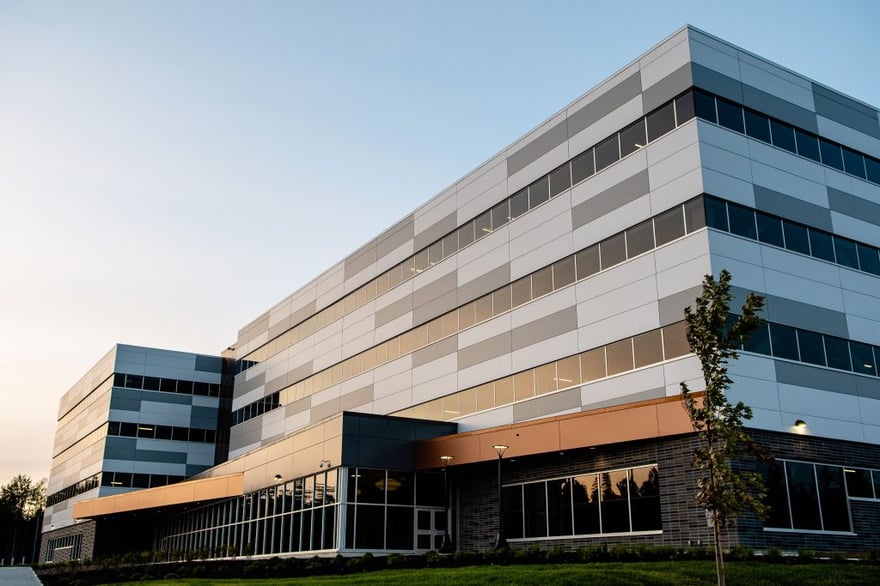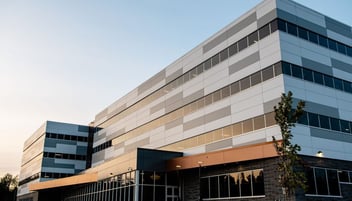Knowledge Park: Showcasing Continued Leadership in Atlantic Canada’s Tech Ecosystem With Cyber Centre
Huddle
FREDERICTON – Cybersecurity is one of the fastest-growing sectors in the world, with Cybersecurity Ventures projecting 3.5-million unfilled jobs by 2021. Larry Shaw, the CEO of Ignite Fredericton and Knowledge Park says that with the opening of the new Cyber Centre, our Region can attract a significant number of those jobs.
The Cyber Centre, a project driven by Knowledge Park, which is owned by the economic development agency Ignite Fredericton, is a newly built 142,000-square-foot building that will house major companies operating in the sector like Bulletproof Solutions, Canadian Nuclear Laboratories, Siemens, and Cyber NB.
Shaw says the Cyber Centre, at a capital cost of $37M, will be another vital asset for our region as it supports more than 600 cyber security jobs adding in excess of $125M in GDP for New Brunswick. Knowledge Park, created in 1998, currently has approximately 800 people working with more than 40 companies.
“The Cyber Centre is the manifestation of the overall strategy that’s been developing in Fredericton for a number of years,” says Shaw. “The centre is not just a building with spaces to rent. The four-storey, two-tower complex has the ability to function at a level two security That means companies can conduct sensitive projects and research with the highest level of security,” said Shaw.
The Cyber Centre also has “operational resilience” to function independently for up to 96 hours. This is accomplished through the buildings redundant, and diversified services and post-disaster building design.
As part of the Knowledge Park ecosystem, the centre has a unique opportunity to facilitate collaborations between businesses, academic institution, and governments.
“Clustering of knowledge sector organizations, researchers, and entrepreneurs enable collisions to take place which in turn drives innovation.” said Shaw.
Shaw says that growth in this sector in the province won’t just take place in cybersecurity companies themselves. Companies and institutions of all kinds have a need for cybersecurity solutions– from healthcare to education to large industrial development like small nuclear reactors – and the talent to implement them.
“Cybersecurity is enabling some of these other very cool opportunities that we have in the province,” says Shaw. “We are in a perfect storm of being able to grow the cybersecurity industry to a significant size.”
With the addition of the Cyber Centre, Shaw says that Fredericton now has a growing cluster of cybersecurity companies and institutions like the University of New Brunswick (UNB), which hosts a Canada Research Chair in Cybersecurity and the Canadian Institute for Cybersecurity (CIC).
“The university was at the forefront of trying to tackle the challenges associated with computer systems and dealing with attacks,” says UNB President Paul Mazerolle.
UNB has a land agreement and partnership with Knowledge Park, and the Cyber Centre is the latest in many building initiatives.
“It’s a really important asset for this region and the province, and one that we’re obviously very supportive of,” says Dr. Mazerolle. “In 10 years, we’ll be able to talk about the impact of the Cyber Centre and how it created other opportunities for growth and innovation in the sector for the province.”
With each academic year, Mazerolle observes UNB students and recent graduates develop local contacts in the industry, take on experiential learning opportunities, and contribute to solving industry problems right here at home. He looks forward to seeing the already vibrant cybersecurity ecosystem in Fredericton grow.
“Here’s another world-class facility, so we can attract global companies and global talent to come here and work and thrive and have impact,” says Dr. Mazerolle.
Shaw says the centre and the sector in general will grow the economy and the community, with many indirect benefits and opportunities.
“As we grow the cybersecurity sector, and we bring more companies and hire more people, every citizen is going to benefit indirectly from the spin-off with restaurants and housing and all those things that support people and are a staple of people’s lives,” says Shaw.
Read the original article here
.png?width=600&height=187&name=Untitled%20design%20(2).png)



